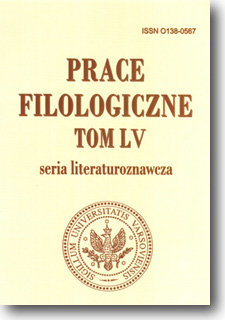Miejsce Kresów/Pogranicza w „rodzinnej”/„mojej” Europie. Próba lektury wybranych utworów powojennej prozy polskiej o tematyce kresowej...
The Place of {Kresy}/Eastern Borderlands in “Native”/“My” Europe. An Attempt to Read Post-War Polish Prose on Borderlands from the Perspective...
Author(s): Hanna GoskSubject(s): Language and Literature Studies
Published by: Wydział Polonistyki Uniwersytetu Warszawskiego
Keywords: literatura polska; Kresy; badania postkolonialne; Polish literature; Kresy (the Eastern Borderlands); postcolonial studies
Summary/Abstract: The article presents a comparison between two examplary prose works (Czesław Miłosz’s {Native Realm}, and A. Stasiuk and J. Andruchowycz’s {Of My Europe}), which are similar in their autobiographical, essayistic character, yet differ due to the circumstances and the time of their creation. In various ways, both disclose the voice of the Borderlands’s ‘I’, which attains the point of self-vivisection of its own post-dependency status. The analysis takes into consideration the perspective of post-colonial, or rather postdependency studies, as this new term seems considerably more suitable in reference to Polish realities. The author attempts to prove that the perspective of post-colonial/postdependency research could be inspiring to literary studies concerned with the Borderlands issues, due to the fact that post-colonial rhetoric undermines established, neutralized systems of representing or constructing the world; they indicate that representation is, in its essence, a creation of reality from dominant and recognized perspectives perceived as natural in a regulatory, ideological discourse. In the course of argumentation, it is revealed that each of the discussed authors intuitively feels the overpowering character of the classic Borderlands discourse and attempts to distance himself accordingly, so as to operate within a more authentic discourse of frontiers (not the Borderlands/{Kresy}); this, paradoxically, results in presenting the Borderlands discourse as deeply rooted in the collective consciousness as it constitutes, in more or less clear way, the pivotal point and the system of reference of both analyzed texts.
Journal: Prace Filologiczne
- Issue Year: 2008
- Issue No: 55
- Page Range: 111-120
- Page Count: 10
- Language: Polish

